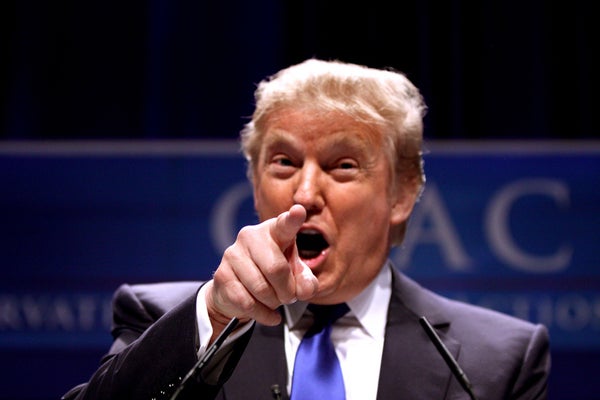This article was published in Scientific American’s former blog network and reflects the views of the author, not necessarily those of Scientific American
For many Americans, the election of Donald J. Trump to the presidency came as a total shock.
A man who called climate change a Chinese hoax, wants to abandon the Paris climate agreement, and pledges to bring coal production back despite intractable market forces will take the helm of the United States on January 20, 2017.
These positions are not only counterproductive to the global effort to mitigate climate change, but also display an irresponsible level of ignorance or indifference to scientific, diplomatic, and economic realities.
On supporting science journalism
If you're enjoying this article, consider supporting our award-winning journalism by subscribing. By purchasing a subscription you are helping to ensure the future of impactful stories about the discoveries and ideas shaping our world today.
Regardless of one’s political affiliations, a critical analysis of the facts will reveal that climate change is a scientific reality caused by carbon dioxide emissions, that the United States has more to lose from pulling out of the completed Paris climate accords than it has to gain, and that there is little the President of the United States can do to bring coal mining in Appalachia back to the prosperous levels that prevailed through much of the 20th century.
But in large part, facts don’t matter anymore. In many ways, the election of Trump to the presidency is simply the culmination of a gradual slide into a post-truth era, where objective facts are less influential in shaping public opinion than appeals to emotion and personal belief. One indication of the larger social movement away from facts is the rise of “fake news” from manufactured sites peddling blatant falsehoods. Just read this account from a prolific creator of fake news stories, whose fictional musings made it to Trump campaign manager Corey Lewandowski’s Twitter feed and generated $10,000 a month in advertising revenue. At the end of the 2016 presidential campaign, the top 20 fake news stories shared on Facebook garnered more clicks than the top 20 mainstream news stories.
While Trump might be the post-truth commander-in-chief, the culpability for the rise of the post-truth era lies with both the left and the right. Green Party presidential candidate Jill Stein is well known for paying lip service to the anti-vaccine movement and inflating the risks of nuclear energy. And Democratic candidate Bernie Sanders argued that those who say fracking can be done safely are wrong, contradicting the findings of the U.S. Environmental Protection Agency and academic experts.
The downfall of facts is an affront to scientists, engineers, and the wider community of experts. Yet in many ways the rise of the post-truth era represents a failure of experts to engage with the political process and with everyday Americans.
The onus for defending truth from the forces of disinformation lies with experts. We cannot simply wag our collective finger at the Trump administration, or let the forces of anger overcome the better angels of our nature. Rather, scientists, engineers, and experts of all stripes must engage with the nascent Trump administration to ensure that the post-truth thinking that pervaded the campaign does not come to drive federal policymaking. That means listening to the Trump administration and its supporters in a sincere way and doing our best to meet them where they are without sacrificing who we are.
Perhaps the best way to effectively engage the Trump administration is by applying for one of over 4,000 presidential-appointed positions in the federal government. At least prior to his victory, Trump was a pariah amongst the mainstream Washington community. That means there is a significant opportunity for outsiders to participate in the policymaking process. If you know a thing or two about the environment, energy, education, medicine, international development, diplomacy, or any one of the dozens of policy areas called out in the online application, now is the time to make your voice heard.
The need to stand up for the truth has never been greater. The rational middle might not draw as much raw popularity as the ideological extremes, but in the largely apolitical civil service positions of the executive branch it can be truly powerful. The expert community must not disengage, but rather must step up to ensure that facts and science maintain their rightful place in American policy.
